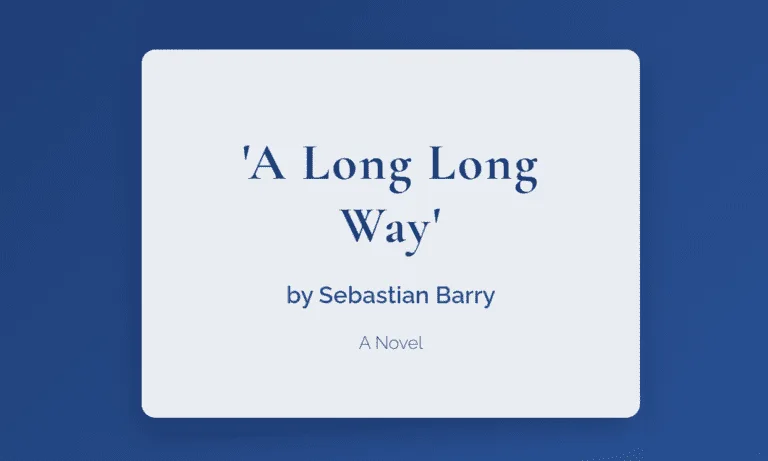Sebastian Barry, an acclaimed Irish playwright, novelist, and poet, has consistently explored the complexities of Irish history and identity throughout his career. “A Long Long Way,” published in 2005, is the third novel in Barry’s informal family saga, following the Dunne family through various periods of Irish history.
Table of Contents
This historical novel, set against the backdrop of World War I, delves deep into the experiences of young Irish soldiers fighting for the British Army while their homeland teeters on the brink of rebellion. Barry’s lyrical prose and keen insight into human nature bring to life the tumultuous era, exploring themes of national identity, loyalty, loss of innocence, and the devastating impact of war. Through its unflinching portrayal of conflict both on the battlefield and within the protagonist’s heart, “A Long Long Way” stands as a powerful testament to the human cost of war and the complex nature of Irish identity in the early 20th century.
Brief Summary
“A Long Long Way” follows the story of Willie Dunne, a young Dubliner who enlists in the Royal Dublin Fusiliers to fight in World War I. At just over five feet tall, Willie is too short to follow in his father’s footsteps as a policeman, but finds purpose in joining the army. The novel chronicles Willie’s experiences on the Western Front, where he faces the horrors of trench warfare, poison gas attacks, and the relentless carnage of modern combat.
Parallel to his wartime experiences, Willie grapples with the changing political landscape in Ireland, as the 1916 Easter Rising erupts back home. Caught between his loyalty to the British Crown and his sympathy for the Irish rebels, Willie finds himself in a crisis of identity that mirrors the larger conflicts of his time. Through Willie’s journey, Sebastian Barry paints a vivid picture of the physical and emotional toll of war, the complexities of Irish politics, and the personal struggles of a young man coming of age in a world torn apart by violence.
The Brutality of War
Sebastian Barry’s depiction of World War I is unflinching in its portrayal of the conflict’s brutality. Through Willie’s eyes, readers are immersed in the hellish conditions of trench warfare. The author’s vivid, often poetic descriptions bring the horrors of the battlefield to life:
“The mud. There was nothing in the whole of creation quite like the mud of Flanders. It was like a monster itself, a growing, spreading monster that swallowed up everything, men, horses, guns, hope.”
This visceral portrayal serves not only to illustrate the physical challenges faced by soldiers but also to underscore the psychological toll of constant exposure to death and destruction. Barry’s focus on the sensory details of war – the sounds, smells, and textures of the battlefield – creates an immersive experience that drives home the reality of conflict in a way that mere facts and figures cannot.
Irish Identity in Crisis
At the heart of “A Long Long Way” is the exploration of Irish identity during a period of intense national upheaval. Willie Dunne’s personal struggle mirrors the larger conflict facing Ireland as a whole. As a soldier fighting for the British Army, Willie initially believes in the cause he’s fighting for. However, his perspective begins to shift as he learns of the Easter Rising and the growing push for Irish independence.
Barry masterfully portrays this internal conflict through Willie’s thoughts and conversations:
“He was Irish and he was in an Irish regiment. But he was in the British army. It was a subtle distinction but a real one.”
This quote encapsulates the complex position of many Irish soldiers who found themselves fighting for Britain while their homeland sought independence. Through Willie’s evolving understanding of his national identity, Barry explores the nuanced and often contradictory nature of loyalty and belonging in a time of political upheaval.
Read this too: 4 Great Works of James Joyce: From Dubliners to Finnegans Wake
Loss of Innocence
The novel powerfully depicts the loss of innocence experienced by Willie and his fellow soldiers. When Willie first enlists, he is a naive young man, full of idealism and a sense of adventure. However, as he faces the realities of war, this innocence is gradually stripped away. Sebastian Barry’s portrayal of this transformation is both poignant and devastating:
“He was eighteen going on forty-five. He was a boy and an old man all at once.”
This juxtaposition of youth and premature aging vividly illustrates the profound impact of war on the human psyche. Through Willie’s experiences, Barry explores how conflict not only claims lives but also robs survivors of their youth and innocence, forcing them to confront the darkest aspects of human nature.
The Power of Camaraderie
Amidst the horrors of war, Barry also highlights the intense bonds formed between soldiers. The camaraderie between Willie and his fellow soldiers provides moments of humanity and solace in an otherwise brutal environment. These relationships are often depicted with a tender touch:
“They were all in it together, the living, the dead, and the nearly dead. They were all one army really, one family.”
This sense of unity and shared experience serves as a counterpoint to the divisive forces at work both on the battlefield and back in Ireland. Through these relationships, Barry explores how human connections can provide strength and meaning even in the most dire circumstances.

Literary Techniques in “A Long Long Way”
Barry’s prose style is a defining feature of “A Long Long Way,” elevating the novel beyond a mere historical account to a work of profound literary merit. Several key techniques stand out:
- Lyrical Language: Barry’s background as a poet shines through in his evocative, often musical prose. His descriptions are rich with imagery and metaphor, creating a sensory experience for the reader.
- Stream of Consciousness: The author frequently employs stream of consciousness techniques to convey Willie’s inner thoughts and emotional state, allowing readers to experience his confusion, fear, and moral dilemmas firsthand.
- Juxtaposition: Barry skillfully juxtaposes scenes of brutality with moments of beauty or tenderness, highlighting the complex nature of human experience during wartime.
- Symbolism: The recurring motif of mud serves as a powerful symbol throughout the novel, representing the all-consuming nature of war and the moral quagmire in which Willie finds himself.
These techniques combine to create a deeply immersive and emotionally resonant narrative that brings the historical setting to vivid life while exploring timeless themes of human nature and identity.
Critical Reception and Impact
Upon its release, “A Long Long Way” was met with widespread critical acclaim. It was shortlisted for the Man Booker Prize in 2005 and won the Kerry Group Irish Fiction Award. Critics praised Barry’s lyrical prose and his nuanced exploration of a complex period in Irish history.
The novel has been particularly noted for its contribution to the literature of World War I, offering a distinctly Irish perspective on a conflict often viewed through a British or German lens. Barry’s work has been compared to classic war novels such as Erich Maria Remarque’s “All Quiet on the Western Front” for its unflinching portrayal of the human cost of war.
“A Long Long Way” has also been recognized for its exploration of Irish identity and the complexities of loyalty during a time of national upheaval. By focusing on the experiences of Irish soldiers fighting for Britain, Barry sheds light on a often-overlooked aspect of Irish history, challenging simplistic narratives of the period.
In the years since its publication, the novel has become a significant work in the canon of Irish literature, studied in schools and universities for its historical insights and literary merit. Its themes of identity, loyalty, and the impact of political conflict on individuals remain relevant in contemporary discussions of nationalism and war.
Conclusion
Sebastian Barry’s “A Long Long Way” stands as a powerful and poignant exploration of war, identity, and the human spirit. Through the journey of Willie Dunne, Barry offers a deeply personal perspective on the monumental events of World War I and the Irish struggle for independence. The novel’s unflinching portrayal of the brutality of war, combined with its lyrical prose and nuanced character development, creates a work that is both historically illuminating and emotionally resonant.
By focusing on the experiences of Irish soldiers fighting for Britain, Barry complicates our understanding of this pivotal period in history, challenging readers to consider the complexities of national identity and loyalty in times of conflict. The novel’s exploration of the loss of innocence and the transformative power of war speaks to universal human experiences, transcending its specific historical setting.
“A Long Long Way” not only enriches our understanding of a crucial period in Irish and world history but also serves as a testament to the enduring power of literature to illuminate the human condition. In Willie Dunne’s story, we find a reflection of the struggles, sacrifices, and moral dilemmas faced by countless individuals caught in the crucible of war and national upheaval. As such, Barry’s novel remains a vital and deeply moving work, inviting readers to reflect on the costs of conflict and the nature of identity in an ever-changing world.


